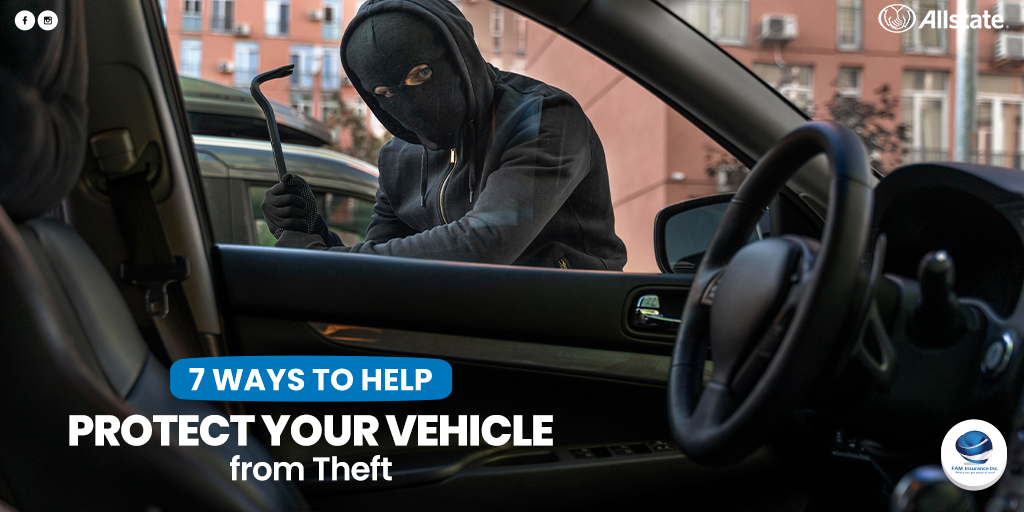Car theft has been on the rise over the last couple of years. In addition to the major inconvenience a stolen vehicle has on its owner, it’s also a major expense.
Tips to help protect your car from theft
Park Smart
If you have a garage, use it. This means keeping the garage door closed and the door to your house locked too. “Out of sight, out of mind,” says Cosentino. It’s easier to take a car that’s out on the street.
If you must park outside, be sure to park in well-lit areas and use your parking brake. If parking in your driveway, park a front-wheel-drive vehicle in front first, and back in a rear-wheel-drive, which will make it harder to tow away.
If you have two vehicles, park the less expensive vehicle behind the more expensive one.
Install an aftermarket immobilizing device
An immobilizer is a device that is found in your car which prevents it from starting unless a special key or sequence of buttons are pressed to activate it. It’s used as a safeguard to help prevent your car from being stolen. Some vehicles are equipped with a factory-installed immobilizer, but it may not be enough.
While an immobilizer used to include a steering wheel or brake lock, which require removal before the vehicle can operate, modern devices are much more sophisticated and integrated into your vehicle. Explore your options with a licensed mechanic and have them install it for you.
Install a Tracking System
This may not prevent a theft but tracking systems can help locate and recover a stolen vehicle quickly. They emit a signal that allows police or a monitoring service to keep tabs on where the vehicle goes.
Smaller global tracking system (GPS) units are also available and allow vehicle owners to place devices (sometimes called tags) inside the vehicle, allowing them to locate where the car is via their smart phone.
While this technology may assist you in finding your car in a large parking lot, never go after a stolen vehicle by yourself. Never try to track your car for safety reasons. Always report the information you have gathered to the police.
Don’t make it easy
Always lock your doors and close the windows and sunroof. Never leave keys in the vehicle, even if you’re just stepping away for a minute; even while the vehicle is locked.
“It’s surprising how many people have told me they leave a spare key in their car for emergencies. Don’t,” says Cosentino. “Warm-up thefts are a problem in the winter too – where people start their car and then go back inside their house while the vehicle warms up.”
Try to always maintain control of your keys. “Don’t leave them on the floor next to you while at the gym and avoid leaving your keys with parking attendants and other strangers too.”
Also avoid marking your keys with your name and address in case they are lost. While labeling your keys might help a good Samaritan return your lost keys, someone with less sincere motives will know exactly where to look for your parked car.
Beware keyless entry
While key fobs and push-button starts can come in handy, they have also created a new risk – sometimes called a relay attack.
“You have one thief standing by your car with an electronic relay transmitter, and another thief standing close to you, or your house, with a relay amplifier. The amplifier will pick up the signal from your key fob and transmit it to the other device tricking your car into thinking the key is there,” explains Cosentino.
When at home, “keep your keys away from windows and doors to make it harder for a transmitter to pick up a signal.
Alternatively, you could keep your fob in a metal container, or purchase a key fob blocker pouch that holds your key while in your pocket or purse.” When parking your car, press the lock button on the actual car door while exiting instead of using the key fob to lock the vehicle.
Purchase a vehicle equipped with anti-theft labels
This makes the car less attractive to steal.
Consider also getting your vehicle identification number (VIN) professionally etched onto each window and other major parts of the car.
Not only can these allow the vehicle to be traced and identified more easily after recovery, but it will also be harder to sell.
Add an alarm or security system
“While there are ways around any security system, the more layers of barriers you have, the more likely a thief is to move on to the next vehicle,” says Cosentino. Along with our previous suggestions, consider adding warning devices like an after-market audible car alarms or wheel locks.
What to do if your vehicle is stolen
- Call police as soon as possible and update them with the last known location of your vehicle.
- Contact your insurer to start the claims process right away.
- Never try to track your vehicle personally for safety reasons. Give the GPS information to the police instead.

